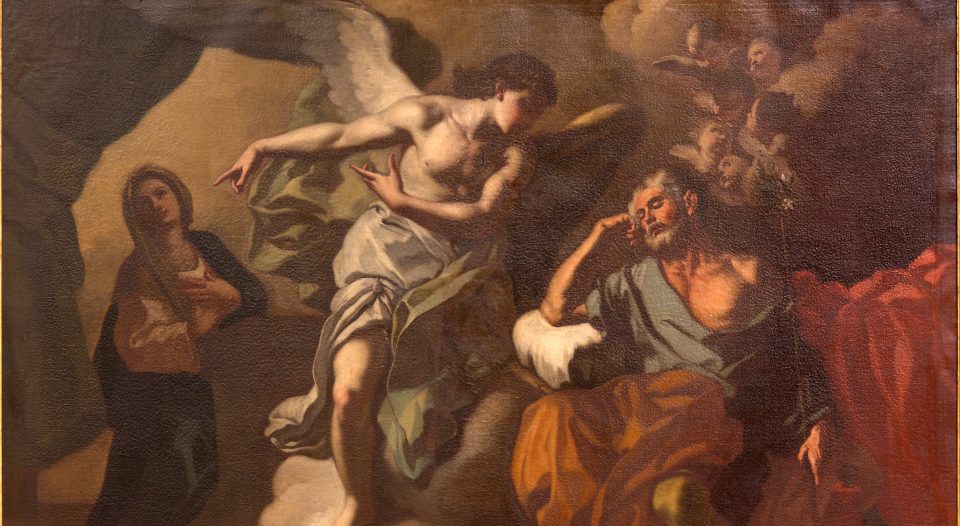Lectionary for Dec. 18, 2022
Fourth Sunday of Advent
Isaiah 7:10-16; Psalm 80:1-7, 17-19;
Romans 1:1-7; Matthew 1:18-25
Every third year it feels as if I’m surprised anew by Matthew’s nativity account. Some of my favorite passages in the whole Bible can be found in Luke 1-2. They tell of Mary and her extended family as they welcome miraculous births of a prophet and a savior. Mary’s song (Luke 1:46-55) is one of the most meaningful presentations of the gospel to me. And yet, Matthew’s Gospel has none of this. Instead, Matthew centers on Joseph’s experience and his role in protecting Mary and Jesus from those who would harm them. I love the stories of Mary, and we will return to focusing on her next week. But this week, let us explore how Joseph prepares for Jesus’ birth, as we do the same.
In Matthew, there is no announcement from the angel Gabriel that Mary will give birth to a miraculously conceived son. Instead, there is only a surprised Joseph, who was engaged to marry Mary. But the text notes, with passive voice, that “before they lived together, [Mary] was found to be with child from the Holy Spirit” (Matthew 1:18). How was it found out? By whom? Did Mary report that she was pregnant to Joseph, or did he hear it through the grapevine? We simply don’t know.
What we do know is that Joseph, who didn’t have any idea that God had anything to do with Mary’s pregnancy, decided to spare her humiliation—and possible lethal judgment—by breaking their engagement quietly. The text notes that he formed this plan to protect the woman who seemingly had betrayed him because he was a righteous man (19). Immediately at the beginning of Matthew’s Gospel, we learn that foregoing vengeance after deep hurt is the mark of righteousness. Perhaps Jesus, in his humanity, learned to forgive and pardon others from Joseph’s righteous and merciful demeanor.
While Joseph was still contemplating his plan for how to spare Mary from disgrace, an angel appeared to him in a dream. The angel told Joseph that the child which Mary was forming was from the Spirit, fulfilling a promise made through the prophet long ago that a young woman would conceive and bear a child who would be called Immanuel. In the original context, God spoke through Isaiah to King Ahaz, promising that the leaders of Aram and the Northern Kingdom of Israel would come to ruin before Isaiah’s son was grown (Isaiah 7:16; 8:1-4). Isaiah’s son would be a sign that “God is with us.” Joseph understood the meaning of the name—that God would be on the move to save God’s people, once again.
The angel told Joseph that the child which Mary was forming was from the Spirit, fulfilling a promise made through the prophet long ago that a young woman would conceive and bear a child who would be called Immanuel.
The angel also specified a name for the child that Joseph’s fiancee was carrying. The baby would be named Jesus (a form of Joshua—“the Lord saves”) because Jesus himself (the text emphasizes) would save his people from their sins. So Joseph knew that Mary’s son would be a sign of deliverance, just as Isaiah’s son was all those years earlier. But instead of marking the defeat of kingdoms, this baby would grow to save people from their sins.
I wonder if Joseph is one of the first people to really understand Jesus’ mission. The past couple weeks, we’ve been talking about John the Baptizer and how, in his insistence on the coming judgment and repentance, he might not have seen the fullness of the kingdom of heaven that Jesus was coming to bring. Certainly, Jesus’ disciples are going to want him to rain fire down on those who oppose them. All too often, I want God to topple the wicked from their places of power. And I believe that God will do that someday. But in the meantime, we could all do worse than preparing ourselves to emulate Joseph—and Jesus—by having our first reaction to hurt and perceived harm be patience and mercy, rather than punishment or revenge.
After Joseph woke up from his dream, he obeyed the angel and took Mary as his wife. Without fully knowing what “the child is of the Holy Spirit” meant (how could he?), Joseph married a woman, pregnant by another. The text is explicit that they didn’t consummate their marriage until after the birth of Mary’s son, whom Joseph named “The Lord saves.” In Matthew’s Gospel, Joseph would continue to receive dreams that would instruct him how to keep Mary and her son safe. As Jesus grew up, Joseph modeled obedience, patience, mercy and righteousness for the growing Messiah.





